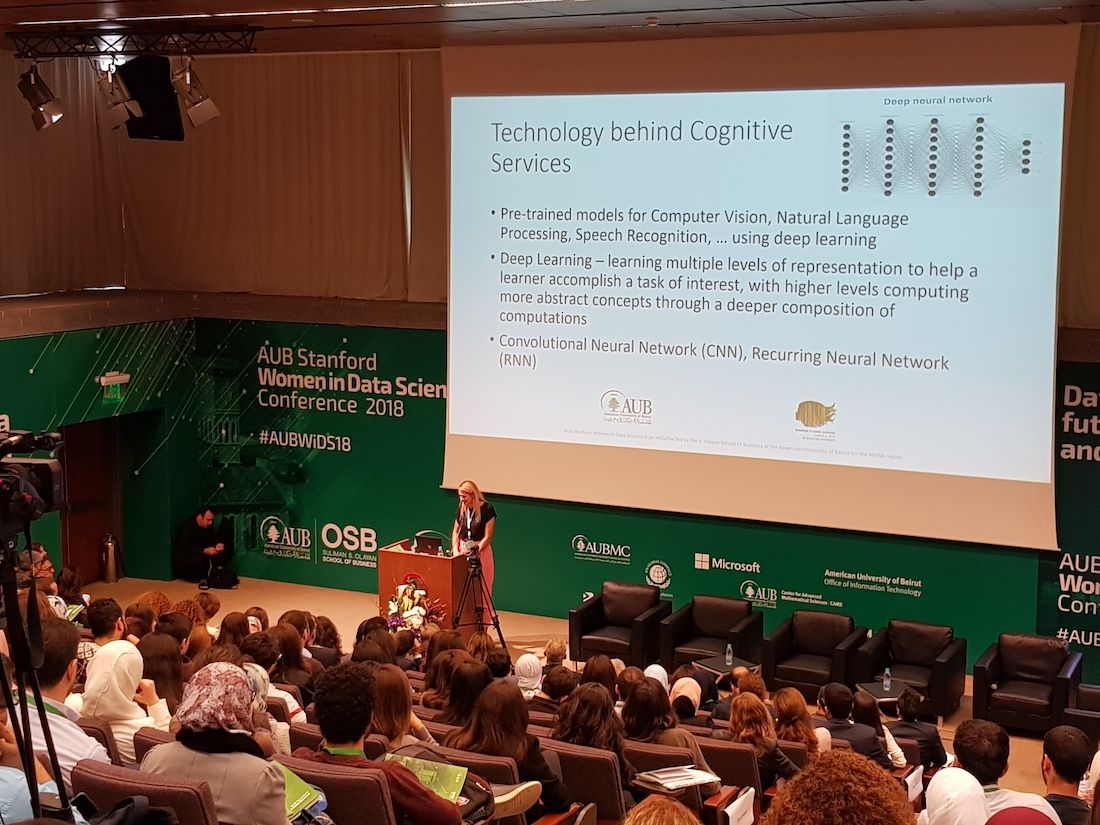Improving electricity and fake news detection through data #AUBWiDS2018

Data desert is a term often used to describe certain areas, whether unprivileged or not, where data is not regularly collected to form a certain pattern ready for analysis. Data desert could include schools, NGOs and other entities that could be dramatically improved if data was tracked, structured, and analyzed. If students’ character, grades, strengths, and weak points were monitored over time, schools would have been able to come up with a better career orientation that’s tailored to each individual.
Data desert was a highly debated subject during AUB Women in Data Science event, which was held on March 5 at the American University of Beirut (AUB) in partnership with the Stanford Institute for Computational and Mathematical Engineering.
“People say we’re witnessing a data explosion and I say no, that’s hardly the case,” said Fatima Abu Salem, an associate professor at AUB specialized in computer science. “It’s a data desert, people have a poor data recording. In public schools, [we] hardly [get] information about refugees’ children,” she added commenting on the fact that we have a lot of data kept in the drawers. “The main driver is data. Starting with recording it, sharing it, processing it, and extracting features. It’s a principle enabler,” said Hoda Daou, an assistant professor at AUB.
The day featured business, technology, and health tracks, where each brought discussions and panels about the role of data in these industries.
In a talk on how artificial intelligence can shape lives, Petra Korica, a technical lead for Microsoft Middle East and Africa, announced Soundscape, a free application that helps visually impaired people navigate around the city.
Another interesting yet more complicated improvement in data research is organ implantation.
Viviane Tabar, a doctor of medicine of neurosurgery at the Cancer Center in New York, has been working for years with a research team on using a human skin sample to re-generate billions of cells, enough to regenerate an entire organism.
These cells can be reprogrammed into a cardiac muscle or any other cell function.
Her research was mainly intended for Parkinson patients, a disease that affects over five million patients worldwide, according to Tabar, and becomes less effective as the disease progresses.
Current treatments include drugs and deep brain stimulation (DBS) which are costly and require follow-up surgeries, she stated.
That said, the global DBS devices market was valued at $4.5 billion in 2012 and is expected to exceed $9 billion by 2019. Using the latest tech experiments will help doctors replace the damaged tissues by new cells, undergo a one-time surgery only to implant the new cells among other benefits.
New projects announced
Three projects were announced by Abu Salem during her talk on doing public good in the Middle East and navigating data and data deserts:
More data, better electricity
More data, better detection of fake news
More data, better prediction of healthcare demand
They were kept low profile because they are still in the research phase. The first one provides a power grid resilience analysis in Lebanon, to expose the vulnerability of the network using algorithms. No further details on how these algorithms work and what do they track were disclosed as the projects are still under study. The outcome of the project will shed lights on the acts of aggression on power generating centers, increase consumption and allow for a bigger carrying capacity caused by the refugees influx.
The second project looks at machine learning for predicting demand on primary healthcare centers. No further explanation were given. The third was about identifying fake news, especially those tied to politics and conflicts in Syria. To do that, the study will draw on expertise in computing, linguistics, and media studies, to analyze unstructured data relating to media accounts in the Syrian war. It will then begin building a dataset of annotated articles (true, fake, and a spectrum in between, live-data streams from many sources, computation, analytics and storage on big data.
A Sci-Fi reality
Connected cars is one of hottest topics on the table right now and regional startups have been actively looking for ways to make cars smarter, sooner. It was also a topic of interest for Mariette Awad, an associate professor at AUB, specialized in electrical and computer engineering. Her talk revealed how big data can help innovators achieve that goal.
“By 2020, we expect many cars to be connected,” she said. Building a smart car will require road safety features, autonomous driving and cognitive, infotainment, which is a service that delivers a mix of information and entertainment and is designed to attract the consumer’s interest through targeted input.

In summary, the event was data-targeted, yet it did not neglect the awareness part. Not to marginalize attending students who are yet to explore data, it organized a roundtable session powered by Wamda and presented by Abu Salem on how we generate data daily, why it’s important to analyze it, and real examples on implementing it. Around 30 girls attended to session, 24 of them where from Girls Got It, an NGO that provides education in science, technology, engineering, art and mathematics fields (STEAM). Most of the students were testing and prototyping ideas related to education (Edutek app), design thinking, building smart cities, and sketching up 3D models of a connected city.
“Today’s world is driven by data, and data science is used to improve a business, or pure research, so there is a person impacted. The power of tech helps us the embark on this journey,” said Jacqui Barret, a lead researcher and data scientist at LinkedIn, California.


